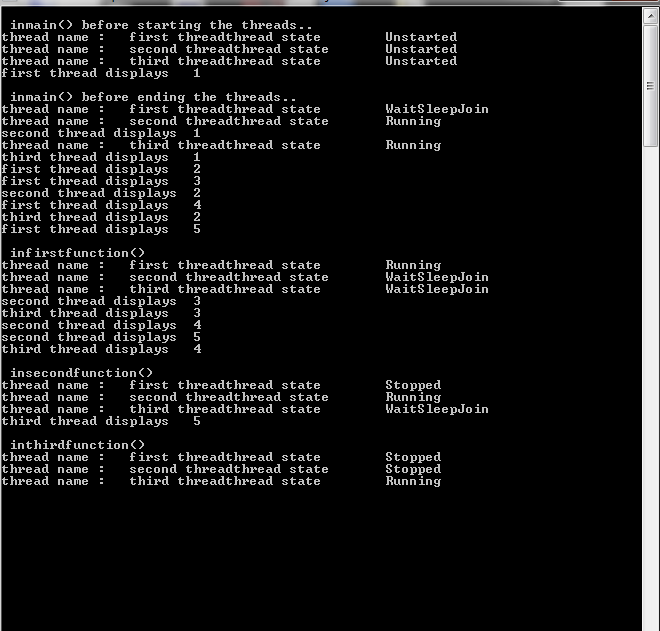Thread State :
every object has its state. For example : water is found in three states , such as solid , liquid , and gas and it can be transform from one state to another. In the same way , threads also have their states and can be transformed from one state to another. The state of thread determines its actual status at a given point of time. you can determine state of a thread by the ThreadState property of the Thread Class.
showing the code of the Thread State application:
using System;
using System.Collections.Generic;
using System.Linq;
using System.Text;
using System.Threading;
namespace thread_state.cs
{
class Program
{
static Thread firstthread;
static Thread secondthread;
static Thread thirdthread;
static void Main(string[] args)
{
firstthread = new Thread(firstfunction);
secondthread = new Thread(secondfunction);
thirdthread = new Thread(thirdfunction);
firstthread.Name = "first thread";
secondthread.Name = "second thread";
thirdthread.Name = "third thread";
StateOfThread("main() before starting the threads..");
firstthread.Start();
secondthread.Start();
thirdthread.Start();
StateOfThread("main() before ending the threads..");
}
// writting a function for determining the state of the thread
public static void StateOfThread(string position)
{
Console.WriteLine("\n in" + position);
Console.WriteLine("thread name :\t" + firstthread.Name + "thread state\t" + firstthread.ThreadState);
Console.WriteLine("thread name :\t" + secondthread.Name + "thread state\t" + secondthread.ThreadState);
Console.WriteLine("thread name :\t" + thirdthread.Name + "thread state\t" + thirdthread.ThreadState);
}
public static void firstfunction()
{
for (int num = 1; num <= 5; num++)
{
Console.WriteLine("first thread displays\t" + num);
Thread.Sleep(2000);
}
StateOfThread("firstfunction()");
}
public static void secondfunction()
{
for (int num = 1; num <= 5; num++)
{
Console.WriteLine("second thread displays\t" + num);
Thread.Sleep(5000);
}
StateOfThread("secondfunction()\t");
}
public static void thirdfunction()
{
for (int num = 1; num <= 5; num++)
{
Console.WriteLine("third thread displays\t" + num);
Thread.Sleep(7000);
}
StateOfThread("thirdfunction()");
Console.ReadKey();
}
}
}
every object has its state. For example : water is found in three states , such as solid , liquid , and gas and it can be transform from one state to another. In the same way , threads also have their states and can be transformed from one state to another. The state of thread determines its actual status at a given point of time. you can determine state of a thread by the ThreadState property of the Thread Class.
States of threads:
Name
|
Description
|
Running
|
Refers to a state in which the
thread is in the execution mode.
|
StopRequested
|
Refers to a state in which a
thread is requested to stop its execution.
|
SuspendRequested
|
Refers to a state in which a
thread is required to suspend its execution.
|
Background
|
Refers to a state in which a
thread is execute as a background thread , as opposed to foreground thread.
|
Unstarted
|
Refers to a state in
which the start() method of the thread
class has not yet been invoked.
|
Stopped
|
Refers to a state in which a
thread has already stopped executing.
|
WaitSleepJoin
|
Refers to a state that occurs
when the wait() , sleep() , and join() method are simultaneously invoked. A thread
in this state stops executing and is considered to be blocked.
|
Suspended
|
Refers to a state in which a
thread has been suspended.
|
AbortRequsted
|
Refers to state in which a
thread is required to stop its functioning permanently.
|
Abort
|
Refers to a state in which a thread
is considered to be dead forever.
|
showing the code of the Thread State application:
using System;
using System.Collections.Generic;
using System.Linq;
using System.Text;
using System.Threading;
namespace thread_state.cs
{
class Program
{
static Thread firstthread;
static Thread secondthread;
static Thread thirdthread;
static void Main(string[] args)
{
firstthread = new Thread(firstfunction);
secondthread = new Thread(secondfunction);
thirdthread = new Thread(thirdfunction);
firstthread.Name = "first thread";
secondthread.Name = "second thread";
thirdthread.Name = "third thread";
StateOfThread("main() before starting the threads..");
firstthread.Start();
secondthread.Start();
thirdthread.Start();
StateOfThread("main() before ending the threads..");
}
// writting a function for determining the state of the thread
public static void StateOfThread(string position)
{
Console.WriteLine("\n in" + position);
Console.WriteLine("thread name :\t" + firstthread.Name + "thread state\t" + firstthread.ThreadState);
Console.WriteLine("thread name :\t" + secondthread.Name + "thread state\t" + secondthread.ThreadState);
Console.WriteLine("thread name :\t" + thirdthread.Name + "thread state\t" + thirdthread.ThreadState);
}
public static void firstfunction()
{
for (int num = 1; num <= 5; num++)
{
Console.WriteLine("first thread displays\t" + num);
Thread.Sleep(2000);
}
StateOfThread("firstfunction()");
}
public static void secondfunction()
{
for (int num = 1; num <= 5; num++)
{
Console.WriteLine("second thread displays\t" + num);
Thread.Sleep(5000);
}
StateOfThread("secondfunction()\t");
}
public static void thirdfunction()
{
for (int num = 1; num <= 5; num++)
{
Console.WriteLine("third thread displays\t" + num);
Thread.Sleep(7000);
}
StateOfThread("thirdfunction()");
Console.ReadKey();
}
}
}
output :

No comments:
Post a Comment